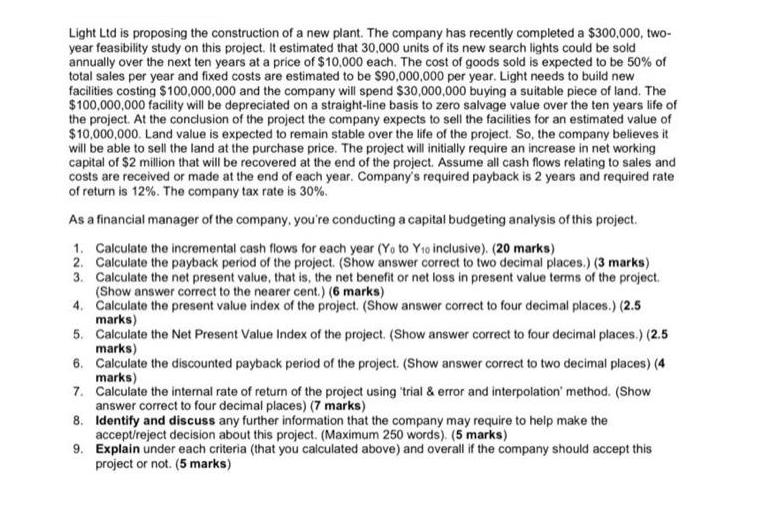Answered step by step
Verified Expert Solution
Question
1 Approved Answer
Light Ltd is proposing the construction of a new plant. The company has recently completed a $300,000, two- year feasibility study on this project.

Light Ltd is proposing the construction of a new plant. The company has recently completed a $300,000, two- year feasibility study on this project. It estimated that 30,000 units of its new search lights could be sold annually over the next ten years at a price of $10,000 each. The cost of goods sold is expected to be 50% of total sales per year and fixed costs are estimated to be $90,000,000 per year. Light needs to build new facilities costing $100,000,000 and the company will spend $30,000,000 buying a suitable piece of land. The $100,000,000 facility will be depreciated on a straight-line basis to zero salvage value over the ten years life of the project. At the conclusion of the project the company expects to sell the facilities for an estimated value of $10,000,000. Land value is expected to remain stable over the life of the project. So, the company believes it will be able to sell the land at the purchase price. The project will initially require an increase in net working capital of $2 million that will be recovered at the end of the project. Assume all cash flows relating to sales and costs are received or made at the end of each year. Company's required payback is 2 years and required rate of return is 12%. The company tax rate is 30%. As a financial manager of the company, you're conducting a capital budgeting analysis of this project. 1. Calculate the incremental cash flows for each year (Yo to Yo inclusive). (20 marks) 2. Calculate the payback period of the project. (Show answer correct to two decimal places.) (3 marks) 3. Calculate the net present value, that is, the net benefit or net loss in present value terms of the project. (Show answer correct to the nearer cent.) (6 marks) 4. Calculate the present value index of the project. (Show answer correct to four decimal places.) (2.5 marks) 5. Calculate the Net Present Value Index of the project. (Show answer correct to four decimal places.) (2.5 marks) 6. Calculate the discounted payback period of the project. (Show answer correct to two decimal places) (4 marks) 7. Calculate the internal rate of return of the project using 'trial & error and interpolation method. (Show answer correct to four decimal places) (7 marks) 8. Identify and discuss any further information that the company may require to help make the accept/reject decision about this project. (Maximum 250 words) (5 marks) 9. Explain under each criteria (that you calculated above) and overall if the company should accept this project or not. (5 marks)
Step by Step Solution
There are 3 Steps involved in it
Step: 1
Answer i...
Get Instant Access to Expert-Tailored Solutions
See step-by-step solutions with expert insights and AI powered tools for academic success
Step: 2

Step: 3

Ace Your Homework with AI
Get the answers you need in no time with our AI-driven, step-by-step assistance
Get Started


